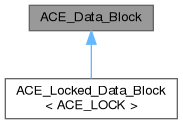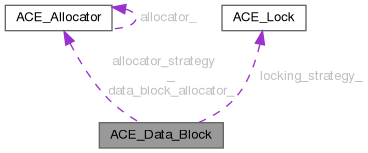Stores the data payload that is accessed via one or more ACE_Message_Block's. More...
#include <Message_Block.h>


Protected Member Functions | |
| virtual ACE_Data_Block * | release_i () |
| Internal release implementation. | |
| int | reference_count_i () const |
| Internal get the current reference count. | |
| ACE_Data_Block * | release_no_delete (ACE_Lock *lock) |
Protected Attributes | |
| ACE_Message_Block::ACE_Message_Type | type_ |
| Type of message. | |
| size_t | cur_size_ |
| Current size of message block. | |
| size_t | max_size_ |
| Total size of buffer. | |
| ACE_Message_Block::Message_Flags | flags_ |
| Misc flags (e.g., DONT_DELETE and USER_FLAGS). | |
| char * | base_ |
| Pointer To beginning of message payload. | |
| ACE_Allocator * | allocator_strategy_ |
| ACE_Lock * | locking_strategy_ |
| int | reference_count_ |
| ACE_Allocator * | data_block_allocator_ |
| The allocator use to destroy ourselves. | |
Private Member Functions | |
| ACE_Data_Block & | operator= (const ACE_Data_Block &) |
| ACE_Data_Block (const ACE_Data_Block &) | |
Friends | |
| class | ACE_Message_Block |
Detailed Description
Stores the data payload that is accessed via one or more ACE_Message_Block's.
This data structure is reference counted to maximize sharing. It also contains the <locking_strategy_> (which protects the reference count from race conditions in concurrent programs) and the <allocation_strategy_> (which determines what memory pool is used to allocate the memory).
Constructor & Destructor Documentation
◆ ACE_Data_Block() [1/3]
| ACE_Data_Block::ACE_Data_Block | ( | ) |
Default "do-nothing" constructor.
◆ ACE_Data_Block() [2/3]
| ACE_Data_Block::ACE_Data_Block | ( | size_t | size, |
| ACE_Message_Block::ACE_Message_Type | msg_type, | ||
| const char * | msg_data, | ||
| ACE_Allocator * | allocator_strategy, | ||
| ACE_Lock * | locking_strategy, | ||
| ACE_Message_Block::Message_Flags | flags, | ||
| ACE_Allocator * | data_block_allocator ) |
Initialize.
◆ ~ACE_Data_Block()
|
virtual |
Delete all the resources held in the message.
◆ ACE_Data_Block() [3/3]
|
private |
Member Function Documentation
◆ allocator_strategy()
|
inline |
Obtain the allocator strategy.
◆ base() [1/2]
|
inline |
Get message data pointer.
◆ base() [2/2]
| void ACE_Data_Block::base | ( | char * | data, |
| size_t | size, | ||
| ACE_Message_Block::Message_Flags | mflags = ACE_Message_Block::DONT_DELETE ) |
Set message data pointer (doesn't reallocate).
◆ capacity()
|
inline |
Get the total amount of allocated space.
◆ clone()
|
virtual |
Return an exact "deep copy" of the message, i.e., create fresh new copies of all the Data_Blocks and continuations. Notice that Data_Blocks can act as "Prototypes", i.e. derived classes can override this method and create instances of themselves.
◆ clone_nocopy()
|
virtual |
As clone above, but it does not copy the contents of the buffer, i.e., create a new Data_Block of the same dynamic type, with the same allocator, locking_strategy, and with the same amount of storage available (if max_size is zero) but the buffer is unitialized. If max_size is specified other than zero, it will be used when creating the new data block.
Reimplemented in ACE_Locked_Data_Block< ACE_LOCK >.
◆ clr_flags()
|
inline |
Clear the message flag bits specified in less_flags and return the new value.
◆ data_block_allocator()
|
inline |
Get the allocator used to create this object.
◆ dump()
| void ACE_Data_Block::dump | ( | ) | const |
Dump the state of an object.
◆ duplicate()
| ACE_Data_Block * ACE_Data_Block::duplicate | ( | ) |
Return a "shallow" copy that increments our reference count by 1.
◆ end()
|
inline |
Return a pointer to 1 past the end of the allocated data in a message.
◆ flags()
|
inline |
Get the current message flags.
◆ locking_strategy() [1/2]
|
inline |
Get the locking strategy.
◆ locking_strategy() [2/2]
Set a new locking strategy and return the hold one.
◆ mark()
|
inline |
Return a pointer to 1 past the end of the allotted data in a message. The allotted data may be less than allocated data if <size()> is passed an argument less than <capacity()>.
◆ msg_type() [1/2]
|
inline |
Get type of the message.
◆ msg_type() [2/2]
|
inline |
Set type of the message.
◆ operator=()
|
private |
◆ reference_count()
| int ACE_Data_Block::reference_count | ( | ) | const |
Get the current reference count.
◆ reference_count_i()
|
inlineprotected |
Internal get the current reference count.
◆ release()
| ACE_Data_Block * ACE_Data_Block::release | ( | ACE_Lock * | lock = 0 | ) |
Decrease the shared reference count by 1. If the reference count is > 0 then return this; else if reference count == 0 then delete this and mb and return 0. Behavior is undefined if reference count < 0.
◆ release_i()
|
protectedvirtual |
Internal release implementation.
◆ release_no_delete()
|
protected |
◆ set_flags()
|
inline |
Bitwise-or the more_flags into the existing message flags and return the new value.
◆ size() [1/2]
|
inline |
Get the total amount of allotted space in the message. The amount of allotted space may be less than allocated space.
◆ size() [2/2]
Set the total amount of space in the message. Returns 0 if successful, else -1.
Friends And Related Symbol Documentation
◆ ACE_Message_Block
|
friend |
Decrease the reference count, but don't delete the object. Returns 0 if the object should be removed. If lock is equal to the locking strategy then we assume that the lock is being held by the current thread; this is used to release all the data blocks in a chain while holding a single lock.
Member Data Documentation
◆ allocator_strategy_
|
protected |
Pointer to the allocator defined for this ACE_Data_Block. Note that this pointer is shared by all owners of this ACE_Data_Block.
◆ base_
|
protected |
Pointer To beginning of message payload.
◆ cur_size_
|
protected |
Current size of message block.
◆ data_block_allocator_
|
protected |
The allocator use to destroy ourselves.
◆ flags_
|
protected |
Misc flags (e.g., DONT_DELETE and USER_FLAGS).
◆ locking_strategy_
|
protected |
Pointer to the locking strategy defined for this ACE_Data_Block. This is used to protect regions of code that access shared ACE_Data_Block state. Note that this lock is shared by all owners of the ACE_Data_Block's data.
◆ max_size_
|
protected |
Total size of buffer.
◆ reference_count_
|
protected |
Reference count for this ACE_Data_Block, which is used to avoid deep copies (i.e., clone()). Note that this pointer value is shared by all owners of the <Data_Block>'s data, i.e., all the ACE_Message_Blocks.
◆ type_
|
protected |
Type of message.
The documentation for this class was generated from the following files: